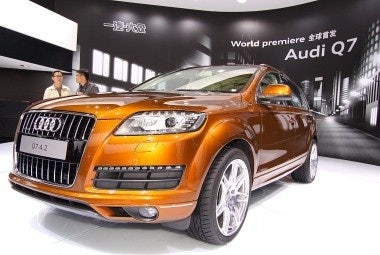Company Plans New Strategies To Tap In To Rising Consumer Demand, Including Release Of New Models And Broader Financing and Leasing Options#

Fresh off the news this week that Audi has beaten its 2008 record for car sales in China -- and that the German automaker expects to sell more than 130,000 cars in China this year -- the company this week also announced that it expects China to become its largest single market by 2012 or 2013. As anyone who has spent a significant amount of time in China can testify, (virtually always black) A4s and A6s are ubiquitous on the roads of every major Chinese city, and the company's sales figures for these two models reflects their sustained popularity -- the number of A4s sold in China has increased some 62% over the year before, and A6s have seen a 16% sales boost. Although part of this year's jump in auto sales can be attributed to the Chinese government's stimulus package and tax incentives, companies like Audi see the potential for continued expansion in that country in the years ahead, as incomes rise in second- and third-tier cities and more potential car buyers develop the means to move up to a mid-range luxury car.
From the Wall Street Journal:
[Peter Schwarzenbauer, Audi's executive board member responsible for sales and marketing], said annual sales in China might soar to 250,000 cars by 2012 or 2013 as Audi is preparing to launch several new or revamped models, ramping up local production and expanding its dealership network.
...
In the January-August period, passenger-vehicle sales in China rose 37% to 6.23 million, according to the China Association of Automobile Manufacturers, while total vehicle sales rose 29% on the year to 8.33 million.
Some analysts have voiced concern that the tax break advanced future demand and sales may collapse when it expires. Mr. Schwarzenbauer said Audi "sees no signs" of an imminent market slump. He noted that the premium segment in China still accounts for only 5% of the overall market, but is expected to grow to around 8% by 2015, with the overall market rising to between 12 million and 14 million annual vehicle sales by then.
Strategy in China is obviously going to be key for Audi, if it is to meet its projected sales figures for the next 3 years. With the gradual appearance of domestic luxury models -- which likely won't be able to really compete with major German brands like Audi, Mercedes-Benz (Audi's biggest competitor in China) and Porsche for at least 5-10 years -- the company is going to find that it will have to work harder to maintain its prestige and not be seen as spreading itself too thin.
With the premiere of the Audi Q7 at the Shanghai Auto Show earlier this year, and announcements about the release of new, more affordable models, Audi risks being seen as too accessible, and with the Chinese luxury buyer's knack for buying exclusivity, Audi could find that its China strategy ends up diluting the brand and leaving it vulnerable to losing market share to up-and-coming Chinese brands (who know the market and the consumer backwards and forwards).